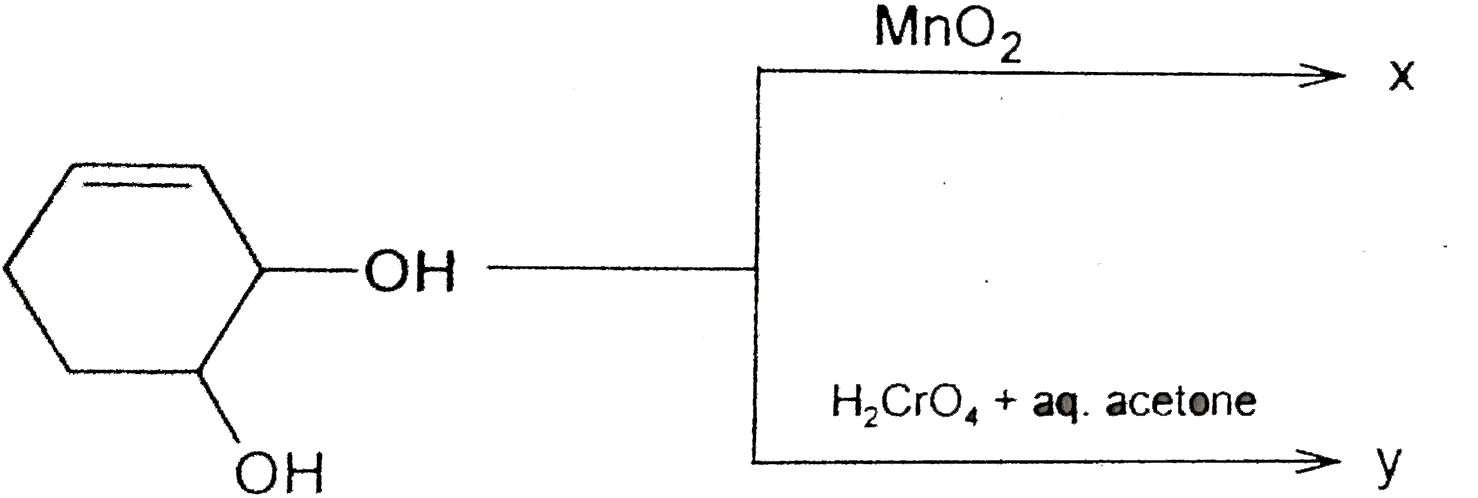The temporary hardness of a water sample is due to compound X. Boiling this sample converts X to compound Y. X and Y, respectively, are :
Mg(HCO3)2 and MgCO3
Ca(HO3)2 and CaO
Ca(HCO3)2 and Ca(OH)2
Mg(HCO3)2 and Mg(OH)2
The correct Answer is:A
To solve the question regarding the temporary hardness of a water sample and the compounds involved, we can follow these steps:
1. Understand Temporary Hardness:
- Temporary hardness in water is primarily caused by the presence of bicarbonates of calcium and magnesium. These bicarbonates dissolve in water and contribute to hardness.
2. Identify Compound X:
- The question states that the temporary hardness is due to compound X. Since we are dealing with temporary hardness, we can deduce that compound X is likely a bicarbonate of either calcium or magnesium.
3. Boiling the Water:
- When water containing bicarbonates is boiled, the bicarbonates decompose. This process converts the soluble bicarbonates into insoluble carbonates, which precipitate out of the solution.
4. Identify Compound Y:
- Upon boiling, magnesium bicarbonate (Mg(HCO₃)₂) decomposes to form magnesium carbonate (MgCO₃), which is insoluble in water. Therefore, compound Y is magnesium carbonate.
5. Conclusion:
- Based on the above reasoning, we conclude that:
- Compound X is Magnesium Bicarbonate (Mg(HCO₃)₂).
- Compound Y is Magnesium Carbonate (MgCO₃).
Final Answer:
- X and Y, respectively, are: Magnesium Bicarbonate and Magnesium Carbonate.
- Temporary hardness in water is primarily caused by the presence of bicarbonates of calcium and magnesium. These bicarbonates dissolve in water and contribute to hardness.
- The question states that the temporary hardness is due to compound X. Since we are dealing with temporary hardness, we can deduce that compound X is likely a bicarbonate of either calcium or magnesium.
- When water containing bicarbonates is boiled, the bicarbonates decompose. This process converts the soluble bicarbonates into insoluble carbonates, which precipitate out of the solution.
- Upon boiling, magnesium bicarbonate (Mg(HCO₃)₂) decomposes to form magnesium carbonate (MgCO₃), which is insoluble in water. Therefore, compound Y is magnesium carbonate.
- Based on the above reasoning, we conclude that:
- Compound X is Magnesium Bicarbonate (Mg(HCO₃)₂).
- Compound Y is Magnesium Carbonate (MgCO₃).
- X and Y, respectively, are: Magnesium Bicarbonate and Magnesium Carbonate.
Topper's Solved these Questions
- BOOK - ICSECHAPTER - HYDROGENEXERCISE - TRUE OR FALSE. TYPE QUESTIONS15videos
HYDROGEN
- BOOK - ICSECHAPTER - HYDROGENEXERCISE - FILL IN THE BLANKS. TYPE QUESTIONS15videos
HYDROGEN
- BOOK - ICSECHAPTER - HYDROGENEXERCISE - ESSAY (LONG ANSWER) TYPE QUESTIONS29videos
HYDROGEN
- BOOK - ICSECHAPTER - HYDROCARBONS EXERCISE - NCERT TEXT-BOOK EXERCISES46videos
HYDROCARBONS
- BOOK - ICSECHAPTER - ORGANIC CHEMISTRY : SOME BASIC PRINCIPLES AND TECHNIQUES EXERCISE - NCERT TEXT-BOOK EXERCISES (WITH HINTS AND SOLUTIONS )72videos
ORGANIC CHEMISTRY : SOME BASIC PRINCIPLES AND TECHNIQUES
Similar Questions
Knowledge Check
- Question 1 - Select One
The temporary hardness of water due to calcium bicarbonate can be removed by adding
ACaCO3BCaCI2CHCIDCa(OH)2 - Question 2 - Select One
A water sample is said to contain permanent hardness if water contains
Asulphates and chlorides of calcium and magnesiumBcarbonates of calcium and magnesiumCbicarbonates of calcium and magnesiumDsulphates and chlorides of sodium and potassium.

The compounds x an y areView SolutionTemporary unstable hardness of water due to presence of :
View SolutionNumber of chiral carbon atoms in the compound W, X, Y and Z respectively would be :
 View Solution
View SolutionThe temporary hardness of water due to calcium bicarbonate can
be removed by addingView SolutionIf hardness of water sample is 200ppm, then select the incorrect statement:
View SolutionHardness of water sample is 300 ppm CaCO3 Hence its molarity is:
View Solution

